It looks like you're using an Ad Blocker.
Please white-list or disable AboveTopSecret.com in your ad-blocking tool.
Thank you.
Some features of ATS will be disabled while you continue to use an ad-blocker.
History Channel Portrays Hannibal as Black, White People Cry Foul Over ‘Historical Revisionism’
page: 3share:
I can save time he wasn't black also wasn't white. we also have coins depicting his father and brother. Carthaginians were Phoenician's it was a
colony that eventually became stronger than there homeland. Meaning they were not from Africa what would be the closest today Lebanese.
edit on 9/12/16 by dragonridr because: (no reason given)
originally posted by: dragonridr
I can save time he wasn't black also wasn't white. we also have coins depicting his father and brother. Carthaginians were Phoenician's it was a colony that eventually became stronger than there homeland. Meaning they were not from Africa what would be the closest today Lebanese.
That's not saying much either way, being technically non African does not mean being non Black I refer you to pg 1, but i'd say we don't know for sure , but more than likely he carried both Eurasian and African genetic stuff.
I think sub sahara africa are clutching at straws.
They have very little history of civilastion so trying to hjack the history of others.
Hannibal was likely mix race if anything.
If they had created all these noble advanced empires, then why were they still pretty much inntge stone age when the rest of world was going through the age of enlightenment?
They have very little history of civilastion so trying to hjack the history of others.
Hannibal was likely mix race if anything.
If they had created all these noble advanced empires, then why were they still pretty much inntge stone age when the rest of world was going through the age of enlightenment?
edit on 12-9-2016 by crazyewok because: (no reason given)
a reply to: crazyewok
The sub Saharan's, like others, have a rich history. Just because the Europeans can't verify it doesn't dismiss it.
If you want to be like that, Europe was in the dark ages while the rest of the world flourished. When the Europeans finally pushed out the rest of the Moors, they finally got access to what they were doing and subsequently, went into a "renaissance". I find it funny that around 1490, when the Moors where no longer in Spain, Portugal launches a "trade route" to get to India and instead lands in America, one of the most questionable pieces of history. I'm off the mind that the Moors or someone under their influence ran across the North American continent, the Europeans found about it after driving them out and having access to their data (in those days, Muslims where damn good sailors) and sent someone (Columbus) to verify the information.
I find their influence very peculiar, especially in Italy and the Mediterranean area during their time.
The sub Saharan's, like others, have a rich history. Just because the Europeans can't verify it doesn't dismiss it.
If you want to be like that, Europe was in the dark ages while the rest of the world flourished. When the Europeans finally pushed out the rest of the Moors, they finally got access to what they were doing and subsequently, went into a "renaissance". I find it funny that around 1490, when the Moors where no longer in Spain, Portugal launches a "trade route" to get to India and instead lands in America, one of the most questionable pieces of history. I'm off the mind that the Moors or someone under their influence ran across the North American continent, the Europeans found about it after driving them out and having access to their data (in those days, Muslims where damn good sailors) and sent someone (Columbus) to verify the information.
I find their influence very peculiar, especially in Italy and the Mediterranean area during their time.
a reply to: LABTECH767
I agree with Labtech767's analysis... they were more likely the "Berber" type, having originally come from Phoenicia. In addition, his family was an upper class family which suggests they had the usual practice of intermarrying only with other elite families and not with the hoi polloi in general.
Children of slaves or captives in that society would end up as slaves themselves - while there were undoubtedly sub-Saharan people in the city, they may have kept to their own sections because of language and culture (another barrier to racial mixing.)
In the end, it doesn't matter to me. I can actually accept both and even a very dark-skinned Hannibal wouldn't ruin my enjoyment of a good film.
N.B.- the art evidence presented was pretty darn weak support for the argument.
I agree with Labtech767's analysis... they were more likely the "Berber" type, having originally come from Phoenicia. In addition, his family was an upper class family which suggests they had the usual practice of intermarrying only with other elite families and not with the hoi polloi in general.
Children of slaves or captives in that society would end up as slaves themselves - while there were undoubtedly sub-Saharan people in the city, they may have kept to their own sections because of language and culture (another barrier to racial mixing.)
In the end, it doesn't matter to me. I can actually accept both and even a very dark-skinned Hannibal wouldn't ruin my enjoyment of a good film.
N.B.- the art evidence presented was pretty darn weak support for the argument.
originally posted by: cenpuppie
The sub Saharan's, like others, have a rich history. Just because the Europeans can't verify doesn't dismiss it.
so rich they lost it
Eskimos! They built a great empire and had planes and giant glass citys and a moon landing 5000 years ago! But you cant verify that either hahaha
originally posted by: cenpuppie
If you want to be like that, Europe was in the dark ages while the rest of the world flourished.
And even in the dark ages we still had Iron working and built citys and even recorded history.
The dark ages were not actually that dark.
On the other hand sub Sahara africa were still a milliania behind.
originally posted by: cenpuppie
When the Europeans finally pushed out the rest of the Moors, they finally got access to what they were doing
Moor were not sub sahara. Yes they were black but not sub Saharan.
originally posted by: cenpuppie
and subsequently, went into a "renaissance".
The renaissance had a number of factors.
originally posted by: cenpuppie
I find it funny that around 1490, when the Moors where no longer in Spain, Portugal launches a "trade route" to get to India and instead lands in America, one of the most questionable pieces of history.
And what great navy or trade routes did Sub Saharans have?
We may have fumbled around exploration but hey least we were building ships and exploring.
originally posted by: cenpuppie
I'm off the mind that the Moors or someone under their influence ran across the North American continent, the Europeans found about it after driving them out and having access to their data (in those days, Muslims where damn good sailors) and sent someone (Columbus) to verify the information.
So because of the lack of achievments your going to still the achievments of portugal and spain?
edit on 12-9-2016 by crazyewok because: (no reason given)
edit on 12-9-2016 by crazyewok because: (no reason
given)
edit on 12-9-2016 by crazyewok because: (no reason given)
edit on 12-9-2016 by crazyewok because: (no reason
given)
a reply to: Flavian
As a strategist Hannibal was lacking.
As a tactician? Cannae stands as testimony to that. The fact that Rome was on the ropes, and he was unable to finish the job, speaks to his lack in the former.
Then he ran up against a more than able tactician, and a, IMHO, marvelous strategist in Scipio, later Africanus--just incidentally, a survivor of Cannae.
Sometimes, it's possible that Hannibal is overrated over all. But as a pure tactician, and all things being equal, I'll put him up against anyone.
As a strategist Hannibal was lacking.
As a tactician? Cannae stands as testimony to that. The fact that Rome was on the ropes, and he was unable to finish the job, speaks to his lack in the former.
Then he ran up against a more than able tactician, and a, IMHO, marvelous strategist in Scipio, later Africanus--just incidentally, a survivor of Cannae.
Sometimes, it's possible that Hannibal is overrated over all. But as a pure tactician, and all things being equal, I'll put him up against anyone.
originally posted by: seagull
As a strategist Hannibal was lacking.
As a tactician? Cannae stands as testimony to that. The fact that Rome was on the ropes, and he was unable to finish the job, speaks to his lack in the former.
Then he ran up against a more than able tactician, and a, IMHO, marvelous strategist in Scipio, later Africanus--just incidentally, a survivor of Cannae.
I completely agree with that assessment. Scipio's strategy to invade Africa was what eventually turned the war and his tactics at Zama are what won it decisively.
originally posted by: crazyewok
originally posted by: cenpuppie
The sub Saharan's, like others, have a rich history. Just because the Europeans can't verify doesn't dismiss it.
so rich they lost it
Eskimos! They built a great empire and have planes and glass citys and a moon landing 5000 years ago! But you cant verify that either hahaha
originally posted by: cenpuppie
If you want to be like that, Europe was in the dark ages while the rest of the world flourished.
And even in the dark ages we still had Iron working and built citys and even recorded history.
The dark ages were not actually that dark.
On the other hand sub Sahara africa were still a milliania behind.
originally posted by: cenpuppie
When the Europeans finally pushed out the rest of the Moors, they finally got access to what they were doing
Moor were not sub sahara. Yes they were black but not sub Saharan.
originally posted by: cenpuppie
and subsequently, went into a "renaissance".
The renaissance had a number of factors.
originally posted by: cenpuppie
I find it funny that around 1490, when the Moors where no longer in Spain, Portugal launches a "trade route" to get to India and instead lands in America, one of the most questionable pieces of history.
And what great navy or trade routes did Sub Saharans have?
We may have fumbled around exploration but hey least we were building ships and exploring.
originally posted by: cenpuppie
I'm off the mind that the Moors or someone under their influence ran across the North American continent, the Europeans found about it after driving them out and having access to their data (in those days, Muslims where damn good sailors) and sent someone (Columbus) to verify the information.
So because of the lack of achievments your going to still the achievments of portugal and spain?
Hi Crazyewok first off so-called Sub Saharans are not clutching at straws ,2nd the Sahara wasn't always a desert and yes civilizations thrived there for x thousands of yrs, one of the oldest urbanized state was concurrent with first dynasty Kmt or Egypt,I should point out Ta-Seti at 4000 B.C when they settled the area they were known as the Wagadgu Empire later known as Ghana, by 2600 B.C they would expand into full bloom trading across the Sahara they would keep their position as top dog until their take over by an upstart Mali in the 13th century A.d
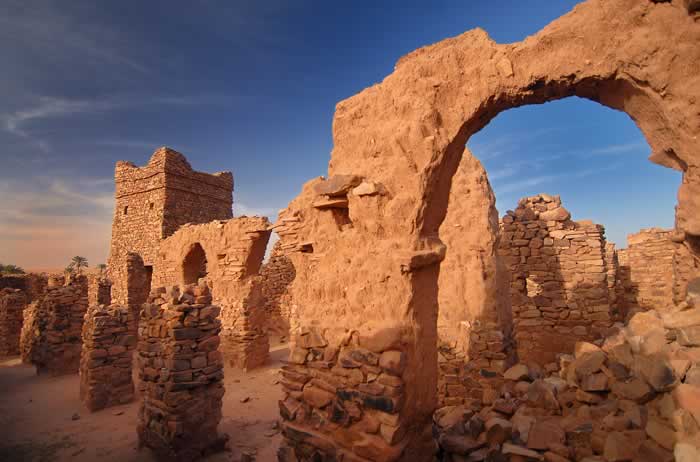
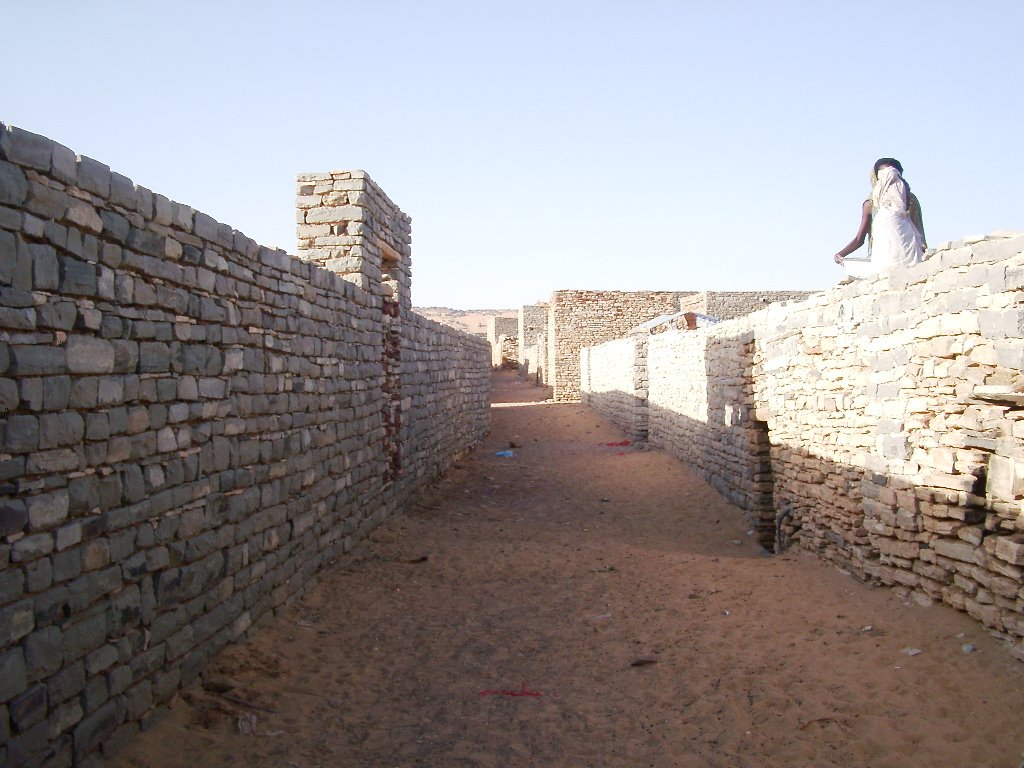
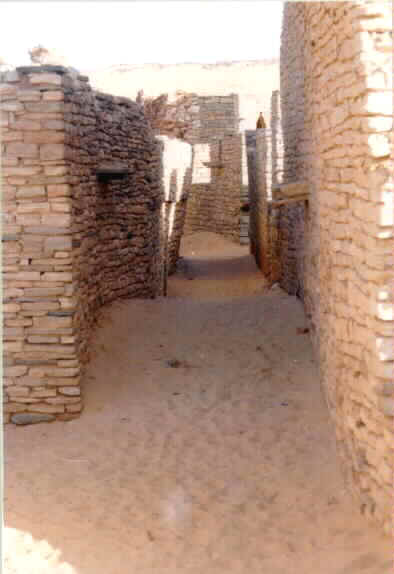
Time and sand have not been kind to these ruins but the Sonniki people that built them is still around,
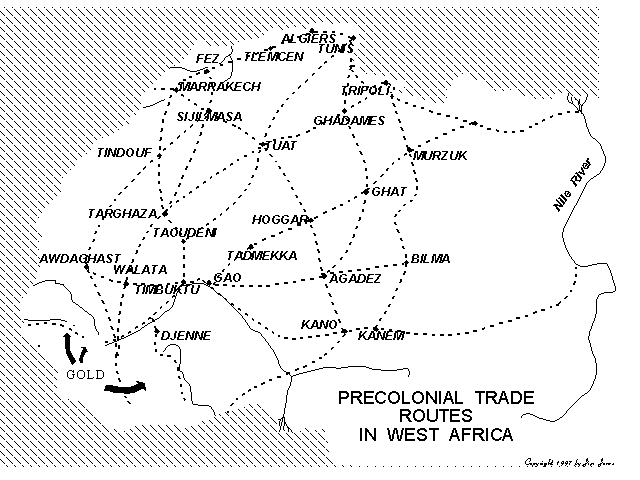
Trades route going back to antiquity
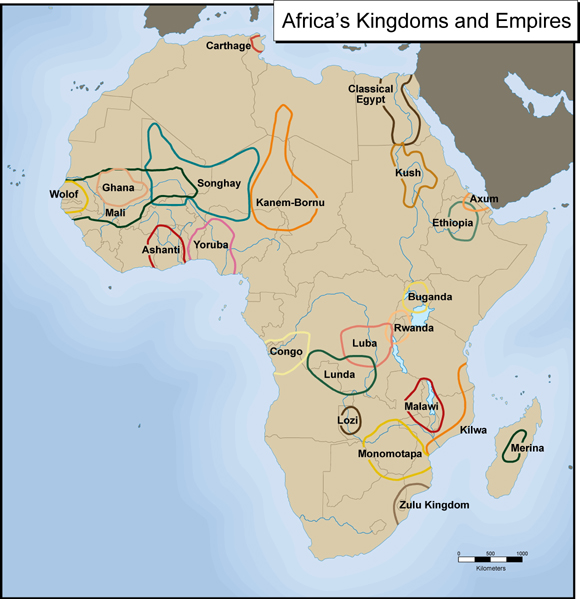
Map of some of Africa's ancient and medieval civilization, matter of fact it is in tropical west Africa that one find the most densely populated urban centers , and as for stone age..heck Africans developed iron independently at a very early date and processing technique reached temperatures not seen until modern times as a matter of fact they were casting steel for export, very few stone aged folks were living in Africa After 2000 B.C perhaps isolates like the San and Batwa ,
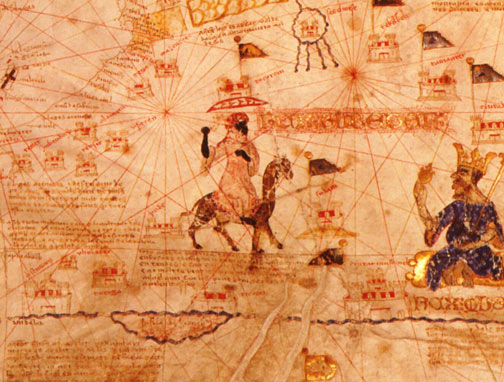
This is Mansa Musa the one seated with the gold nugget, Forbes richest man that ever lived, his trip to Mecca caused the value of gold to drop in the so-called middle east for 12yrs so much of it did he spend, his family controlled much of the world's gold supply the dude on camel is non other than an Almoravid Abu Bakr that started on the Senegal river and reached into Iberia, it was Mali's gold that financed that enterprise.
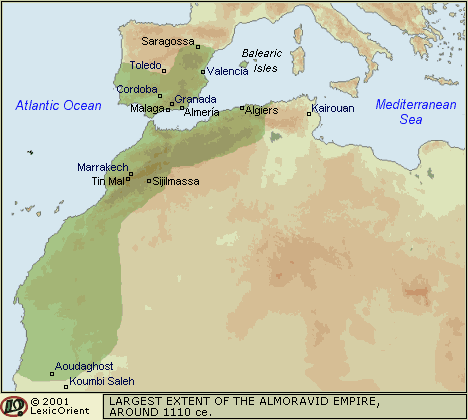
And back to Wagadgu for a min. the Berber Kings had to differ to it's Emperor at times in a most humiliating way.
the Zafun were Soninke too but the king of Zafun is also mentioned as being on the pilgrimage himself, the king himself was probably a Muslim during this time period (mid 12th century) while he was visiting with the Almoravid commander.However Zafun was again ruled by a “pagan” king at a later time. Another source said that the reason for the respect for the king of Zafun was because he was more knowledgeable about "royal authority" and the Almoravids relied on him for different matters of government.
A mysterious passage tells of the visit of a black king from the desert edge state of Zafun to the Almoravid capital of Marrakesh. He rode his horse into the palace. 'The Commander of the Muslims met him on foot, whereas the [king of] Zafun did not dismount for him... he was tall, of deep black complexion and veiled]
books.google.co.jp...=onepage&q&f=false
In other words the pagan Ghana / Wagadugu at the time of Islamic expansion had put them in check, conversion would be a gradual process but not forced.
Added vid to show how populated tropical west Africa was/is ..like I said above sand and times had not been kind.
edit on 12-9-2016 by
Spider879 because: To Add content
Meanwhile in Tropical East Africa, the Swahili city states did build ships along with Somali state and traded as far east as India and China setting
up trading stations.
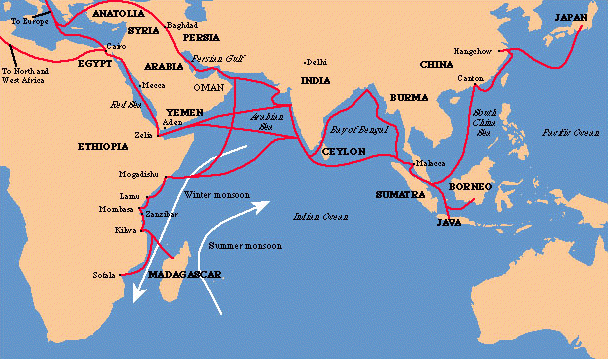
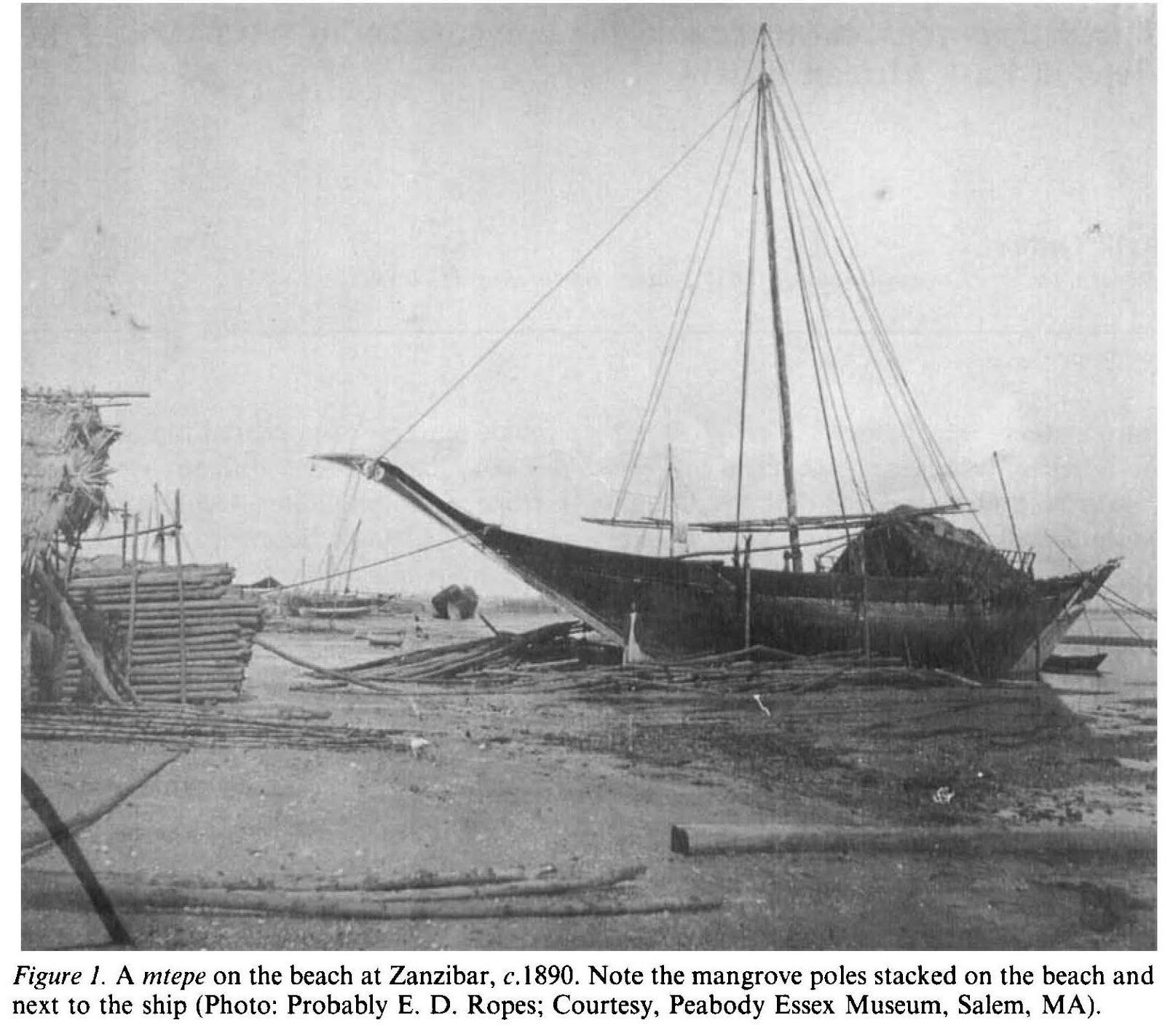
The Built their own trading vessel based off the Arab and Indian dhow , these were no small affair either,
Inner Africans had riverine Navies large enough to transport horse, and baggage for soldiers, they had limited use on the coast as well as they were able to fend off early European vessels in their waters, some were successfully boarded and their entire crew killed or taken as slaves.
These could carry three men across nd a hundred deep, sometimes they were equip with sails.
So Crazyewok for more info go here www.abovetopsecret.com...


The Built their own trading vessel based off the Arab and Indian dhow , these were no small affair either,
Inner Africans had riverine Navies large enough to transport horse, and baggage for soldiers, they had limited use on the coast as well as they were able to fend off early European vessels in their waters, some were successfully boarded and their entire crew killed or taken as slaves.
For example, in 1446, two years later, a ship commanded by Nuno Tristao attempted to land in the Senegal region. It was attacked by African fighters in canoes, and the crew of the ship was wiped out. And in 1447, a Danish raider commanding a Portuguese ship was killed, along with most of his crew, when local African boats attacked.
Although African vessels -- mostly canoes -- were not designed for high-seas navigation, they were fully capable of protecting the coast, even in the 15th century. As a result, in 1456, the king of Portugal dispatched his ambassador, Diogo Gomes, to negotiate treaties of peace and trade with the African rulers along the coast. From that point on, and for 400 years, the African slave trade was conducted as a matter of international commerce among equals.
These could carry three men across nd a hundred deep, sometimes they were equip with sails.
Some canoes were 80 feet in length, carrying 100 men or more. Documents from 1506 for example, refer to war-canoes on the Sierra Leone river, carrying 120 men. Others refer to Guinea coast peoples using canoes of varying sizes- some 70 feet in length, 7-8 ft broad, with sharp pointed ends, rowing benches on the side, and quarter decks or forecastles build of reeds, and miscellaneous facilities such as cooking hearths, and storage spaces for crew sleeping mats. [85] The warriors in some of these accounts were armed with spears, shields and arrows, and were expected to row as well. Each rower kept a bundle of throwing javelins and his shield next to him to repel enemy canoes. Nor were these simply tribal hordes sallying forth on dugouts, but systematically organized units for battle and logistics. In some empires, maritime assets were systematically organized into military and civil spheres. "In war, the canoe performed an important logistics function. The empires of Mali and Songhay for example used canoes to move troops, horses and material quickly to many parts of the realm, as well as for trade and general transport. In Songhay, a Chief of the Waters oversaw all civil matters related to water transport, and a Chief of Canoes supervised naval operations. Big war canoes in this region drew a clear distinction between rowers, (usually 18 to 20) and marine troops (some 70-80 warriors). The boats were equipped with all the necessary provisions and supplies for their mission
So Crazyewok for more info go here www.abovetopsecret.com...
a reply to: seagull
Ah Scipio - and not just Africanus. That particular family produced a fair few extremely able military tacticticians and strategists (and a couple of idiots!).
I have to say, i am a huge fan of Hannibal. I just can't quite believe he didn't finish the job though. That said, Spider is completely correct to say the boule in Carthage were slow to respond to his requests for reinforcements, not wanting to further enhance a rival. They did, though, send reinforcements to Sicily in order to crush Roman ambitions on the island and to relieve some of the pressure on Hannibal.
Subotai still tops the lot for me though. What he accomplished will never be bested.
Ah Scipio - and not just Africanus. That particular family produced a fair few extremely able military tacticticians and strategists (and a couple of idiots!).
I have to say, i am a huge fan of Hannibal. I just can't quite believe he didn't finish the job though. That said, Spider is completely correct to say the boule in Carthage were slow to respond to his requests for reinforcements, not wanting to further enhance a rival. They did, though, send reinforcements to Sicily in order to crush Roman ambitions on the island and to relieve some of the pressure on Hannibal.
Subotai still tops the lot for me though. What he accomplished will never be bested.
a reply to: Flavian
Yes, he was.
The Barca clan/family was by all accounts somewhat unpopular in some circles in Carthage...and with the death of his brother in Spain (Hasdrubal...(sp?)), and him being in Italy, it was as good a time as ever to take the family down a notch. That whole cutting ones nose off to spite their face notion comes quickly to mind... Idiots.
Scipio, that was quite a family, indeed. Right man in the right place. By all accounts a brave man, and politically savvy. I wonder, whenever this topic comes up, what would have become of Rome w/o Scipio Africanus being there? Or if Hannibal had worked just a tad bit harder at raising the country against the Roman Senate? I don't recall any accounts that he even tried at all, much less hard to do it.
Subotai, greatest of the Mongol conquerors, and as far as I've ever read, perfectly content with his lot. I agree with your assessment of him.
Yes, he was.
The Barca clan/family was by all accounts somewhat unpopular in some circles in Carthage...and with the death of his brother in Spain (Hasdrubal...(sp?)), and him being in Italy, it was as good a time as ever to take the family down a notch. That whole cutting ones nose off to spite their face notion comes quickly to mind... Idiots.
Scipio, that was quite a family, indeed. Right man in the right place. By all accounts a brave man, and politically savvy. I wonder, whenever this topic comes up, what would have become of Rome w/o Scipio Africanus being there? Or if Hannibal had worked just a tad bit harder at raising the country against the Roman Senate? I don't recall any accounts that he even tried at all, much less hard to do it.
Subotai, greatest of the Mongol conquerors, and as far as I've ever read, perfectly content with his lot. I agree with your assessment of him.
Four internet comments does not equate to massive outrage and accusations of cultural appropriation.
It was a good episode.
Moving on.
It was a good episode.
Moving on.
originally posted by: seagull
Or if Hannibal had worked just a tad bit harder at raising the country against the Roman Senate? I don't recall any accounts that he even tried at all, much less hard to do it.
He attempted to sway the Italian allies to his cause but the constant foraging to support his army left many of them viewing him as an invader instead of a liberator. Only a handful of allies joined his cause which was also a testament to the system of government the Romans had established prior to the Punic Wars wherein the various tribes were more fully incorporated into Roman government while still retaining their own culture.
edit on 13-9-2016 by AugustusMasonicus because: networkdude once thought he had beer but it turned out to be Natty Ice.
a reply to: AugustusMasonicus
my post got me thinking about that, and I was just reading up on it. For some reason, I don't like reading this sort of stuff on line...I prefer a book in hand, rather than a mouse.
The fact he really didn't garner any allies is testament to the very real strength, as you say, of the Roman Republic. A lesson we are, seemingly, in the process of forgetting...not to go off topic, or anything.
my post got me thinking about that, and I was just reading up on it. For some reason, I don't like reading this sort of stuff on line...I prefer a book in hand, rather than a mouse.
The fact he really didn't garner any allies is testament to the very real strength, as you say, of the Roman Republic. A lesson we are, seemingly, in the process of forgetting...not to go off topic, or anything.
originally posted by: seagull
For some reason, I don't like reading this sort of stuff on line...I prefer a book in hand, rather than a mouse.
I just checked my library and the best book that I have on the subject would be Adrian Goldsworthy's Punic Wars. It went into detail on not only the military strategies but the political and social aspects of what two decades of war entailed.
a reply to: AugustusMasonicus
Is the book any good? Considering other pieces written about the time?
Is the book any good? Considering other pieces written about the time?
originally posted by: Spider879
originally posted by: dragonridr
I can save time he wasn't black also wasn't white. we also have coins depicting his father and brother. Carthaginians were Phoenician's it was a colony that eventually became stronger than there homeland. Meaning they were not from Africa what would be the closest today Lebanese.
That's not saying much either way, being technically non African does not mean being non Black I refer you to pg 1, but i'd say we don't know for sure , but more than likely he carried both Eurasian and African genetic stuff.
There has been DNA studies in fact 28 percent of lebanese can have therr DNA directly linked to pheonician from 5000 years ago. That's why I said you want to see a pheonician there you go. As far as black goes depends on how you define it many Europeans said Greeks were dark skin ed when dealing with skin complexion you being up multiple problems biggest being what you consider black.
Your right to an extent DNA testing has a looked us to group people from ancient times. The confusion comes in because there was diffrent races in thr area remember this was a trade route all thr middle east north Africa and middle east. As I said earlier pheonicians were lebanese in fact studying corpses from pheonician 5000 years ago confirms many today carry thr same DNA.
Same goes with Egypt we can track haplogroups Egyptians for example wasn't much diffrent from today you have light skin and dark skin Egyptians. But today you can see what an Egyptian looks like because they still live there and share thr dame DNA. Was there intermixin of course there was. But overall not as much as people like to think. Here this discusses egyptian DNA by the way they weren't black. But also were not white but somewherw in between. People now make a big mistake trying to say someone looks black or white based off coins or statues. Since people from one area could look very diffrent from abother living less than 100 miles away.
en.m.wikipedia.org...
edit on 9/13/16 by dragonridr because: (no reason given)
new topics
-
Only two Navy destroyers currently operational as fleet size hits record low
Military Projects: 3 hours ago -
George Stephanopoulos and ABC agree to pay $15 million to settle Trump defamation suit
Mainstream News: 8 hours ago
top topics
-
George Stephanopoulos and ABC agree to pay $15 million to settle Trump defamation suit
Mainstream News: 8 hours ago, 17 flags -
Light from Space Might Be Travelling Instantaneously
Space Exploration: 16 hours ago, 9 flags -
The MSM has the United Healthcare assassin all wrong.
General Conspiracies: 17 hours ago, 8 flags -
More Bad News for Labour and Rachel Reeves Stole Christmas from Working Families
Regional Politics: 15 hours ago, 8 flags -
2025 Bingo Card
The Gray Area: 17 hours ago, 7 flags -
Only two Navy destroyers currently operational as fleet size hits record low
Military Projects: 3 hours ago, 6 flags
active topics
-
George Stephanopoulos and ABC agree to pay $15 million to settle Trump defamation suit
Mainstream News • 11 • : WeMustCare -
President-Elect DONALD TRUMP's 2nd-Term Administration Takes Shape.
Political Ideology • 331 • : WeMustCare -
-@TH3WH17ERABB17- -Q- ---TIME TO SHOW THE WORLD--- -Part- --44--
Dissecting Disinformation • 3684 • : duncanagain -
Nov 2024 - Former President Barack Hussein Obama Has Lost His Aura.
US Political Madness • 15 • : WeMustCare -
Former DNI-Congressman John Ratcliffe says the U.S. Government is Intimidated by UFOs.
Aliens and UFOs • 41 • : WeMustCare -
The Mystery Drones and Government Lies
Political Conspiracies • 71 • : cherokeetroy -
One out of every 20 Canadians Dies by Euthanasia
Medical Issues & Conspiracies • 23 • : Daughter2v2 -
Drones everywhere in New Jersey
Aliens and UFOs • 165 • : Zaphod58 -
Mass UAP events. DC. Machester Airport, UFOs over sub base in CT, Nuke bases.
Aliens and UFOs • 57 • : WeMustCare -
FBI Director CHRISTOPHER WRAY Will Resign Before President Trump Takes Office on 1.20.2025.
US Political Madness • 26 • : WeMustCare
